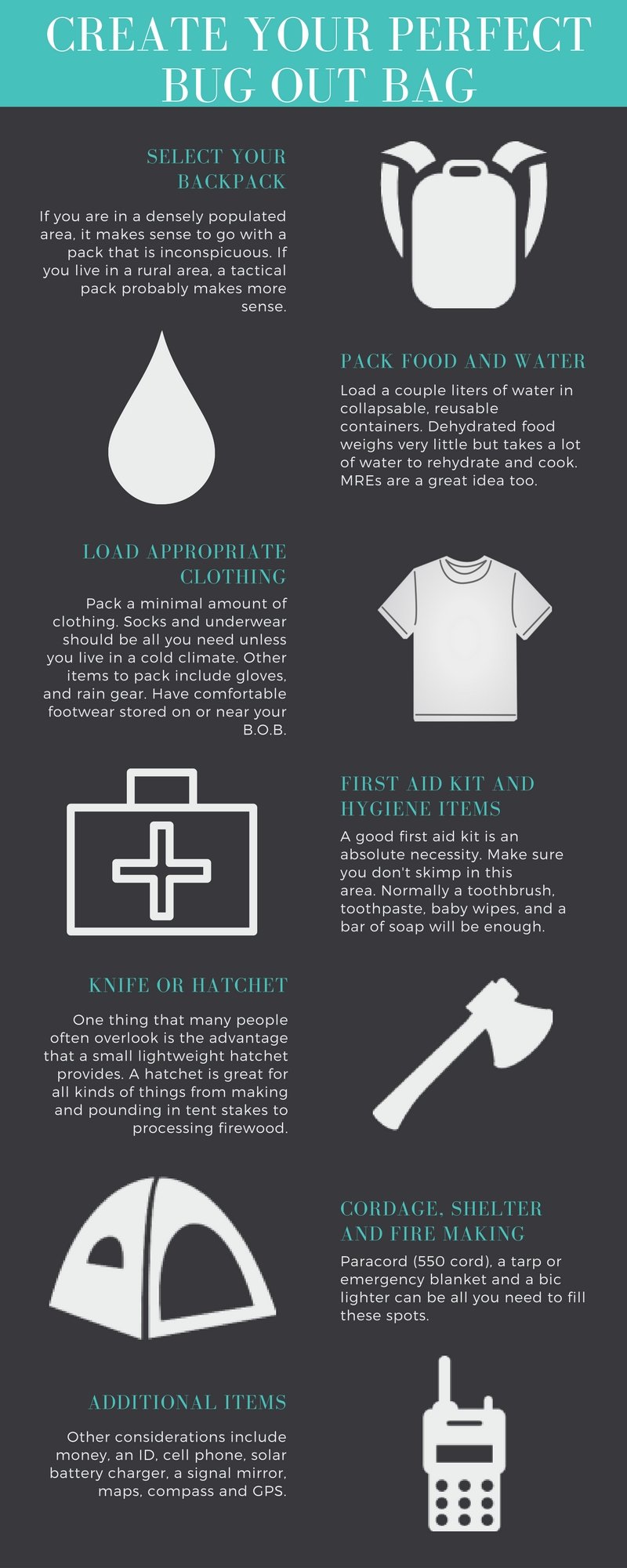Now Reading: How to Create a Bug-Out Bag for Quick Evacuations
-
01
How to Create a Bug-Out Bag for Quick Evacuations

How to Create a Bug-Out Bag for Quick Evacuations
Disaster can strike at any moment, swiftly upending the tranquility of our lives. Whether it’s a sudden natural calamity, a civil unrest, or any unforeseen crisis, having a bug-out bag ready to go can make all the difference between survival and chaos. With its origins rooted in military jargon, a bug-out bag, or a go bag, is essentially a portable kit filled with essentials to sustain you for at least 72 hours during an emergency evacuation. In this article, we delve into the art of crafting the perfect bug-out bag, guiding you through the crucial items to include, expert tips for efficient packing, and strategies to ensure you are equipped to face whatever adversity may come your way. So, let’s dive in and discover how to create a bug-out bag for quick evacuations, because preparedness is the cornerstone of resilience.
Table of Contents
- Gathering Essential Survival Supplies
- Choosing a Durable and Versatile Bag
- Selecting Food and Water Rations for Sustenance
- Safeguarding Personal Hygiene and First Aid
- Including Essential Tools and Equipment
- Q&A
- To Wrap It Up

Gathering Essential Survival Supplies
When it comes to preparing for unexpected emergencies or outdoor adventures, having the right supplies can make all the difference. Here is a comprehensive list of essential items to gather that will help you stay safe and comfortable in challenging situations:
- Water: Start by stocking up on clean water. Aim for at least one gallon per person, per day, to ensure hydration for drinking and other uses.
- Food: Pack non-perishable items that are easy to store and provide sustenance. Canned goods, protein bars, and dried fruits are excellent options.
- First Aid Kit: Be prepared to handle minor injuries with a fully stocked first aid kit. Include adhesive bandages, antiseptic wipes, pain relievers, and any necessary prescription medications.
- Survival Tools: Add a variety of tools to your kit, including a multi-tool, flashlight, matches or lighters, and a pocket knife. These versatile items will come in handy for various tasks.
- Communication: In case of limited cell service or power outages, include a battery-powered radio and extra batteries. It can provide crucial information and keep you connected to emergency broadcasts.
Remember, this is just a starting point for your survival supplies. Customize your kit to suit your unique needs and environment. Don’t forget to regularly check and rotate your items to ensure everything remains in good condition. Preparedness is key when it comes to facing unexpected challenges with confidence!

Choosing a Durable and Versatile Bag
Factors to Consider when
When it comes to selecting a bag that can withstand the test of time while offering versatility, several factors should be taken into account.
First and foremost, focus on the material. Look for bags made from high-quality and durable fabrics such as nylon, canvas, or leather. These materials are not only aesthetically pleasing, but also highly resistant to wear and tear. Additionally, consider opting for bags with reinforced stitching and sturdy hardware to ensure they can handle heavy loads without falling apart.
Next, think about the bag’s design and functionality. Look for multiple compartments and pockets to keep your belongings organized. Whether you need a bag for work, travel, or everyday use, having a variety of compartments allows you to easily access your essentials without having to rummage through the entire bag. Furthermore, consider bags that can be used in multiple ways, such as those with convertible straps or detachable components. This versatility will enable you to adapt your bag to different occasions and personal preferences.
Lastly, durability and versatility should also extend to the bag’s closure system. Opt for bags with reliable closures, such as sturdy zippers or strong magnets, to ensure your belongings remain secure throughout your daily activities.
By considering these factors, investing in a durable and versatile bag will not only save you money in the long run, but also provide you with a stylish and functional accessory that will meet your needs for years to come.
Selecting Food and Water Rations for Sustenance
When it comes to surviving in challenging situations, selecting adequate food and water rations is crucial for sustaining yourself. Remember, your choices will directly impact your energy levels, hydration, and overall well-being. Here are a few pointers to consider:
1. Assess your nutritional needs: Prioritize nutrient-dense options that provide a balance of carbohydrates, proteins, and fats. These macronutrients will fuel your body and help maintain muscle mass. Don’t forget to include a variety of vitamins and minerals through dried fruits, nuts, and supplements, ensuring your body gets the necessary micronutrients.
2. Opt for long-lasting staples: Look for non-perishable items like canned goods, dehydrated meals, and energy bars. These have a longer shelf life, making them ideal for storing in your survival pack. Additionally, pay attention to the expiration dates and rotate your stock regularly to ensure the freshness and potency of your food supply.

Safeguarding Personal Hygiene and First Aid
Personal hygiene and first aid are vital aspects of our everyday lives that often go unnoticed. By maintaining proper personal hygiene, we can safeguard our well-being and prevent the spread of harmful bacteria and germs. It is important to wash our hands regularly with soap and water, especially before and after handling food, using the restroom, or after coming in contact with potentially contaminated surfaces. nnTo ensure optimal personal hygiene, we should also regularly shower or bathe, brush our teeth, and wear clean clothes. Keeping our surroundings clean and tidy is equally important. Regularly disinfecting frequently touched surfaces, such as doorknobs and light switches, is crucial in preventing the spread of illnesses.nnIn addition to personal hygiene, having knowledge of first aid can be life-saving in emergency situations. Understanding basic first aid procedures, such as performing CPR, treating minor wounds, or providing assistance during a choking incident, can make a significant difference until medical help arrives. Building a first aid kit that includes essential items such as adhesive bandages, antiseptic wipes, and disposable gloves is highly recommended. Familiarize yourself with the contents of the kit and keep it accessible in your home, workplace, or vehicle. Remember, being prepared and knowing how to react during an emergency can potentially save lives.
Including Essential Tools and Equipment
When it comes to tackling any project, having the right tools and equipment is crucial. Whether you’re a seasoned professional or a DIY enthusiast, here are some essential items you should consider including in your toolkit:
- Hammers: An all-purpose hammer is a must-have for any toolbox. It’s perfect for driving nails, removing stubborn screws, or general repair tasks.
- Screwdriver Set: A set of screwdrivers in various sizes and types is essential. It allows you to easily tighten or loosen screws of all kinds, be it flathead, Phillips, or Torx.
- Tape Measure: Accuracy is key when measuring for construction or home improvement projects. A durable tape measure will ensure your measurements are precise.
- Drill: Whether it’s for drilling holes, driving screws, or mixing paints, a good drill is a versatile tool that should be in every handyman’s arsenal.
- Safety Gear: Don’t forget to prioritize safety! This includes goggles, masks, gloves, and ear protection to shield yourself from potential hazards.
Remember, these are just a few examples of essential tools and equipment to get you started. Depending on your specific needs, there are countless other items that may be necessary for different projects. So, gear up and explore the vast world of tools and equipment that will empower you to accomplish your tasks with ease!
Q&A
What is a bug-out bag?
A bug-out bag is a portable kit that contains essential items needed to survive for at least 72 hours in the event of an emergency or quick evacuation.
Why should I have a bug-out bag?
Having a bug-out bag ensures that you are prepared for unexpected emergencies or situations where you may need to evacuate quickly. It provides you with the necessary supplies to survive until help arrives or until you reach a safe location.
What should I include in my bug-out bag?
Your bug-out bag should include items such as water, non-perishable food, a first aid kit, flashlight, extra clothing, a multi-tool, a portable radio, personal documents, cash, and any necessary medication. Customize your bag based on your location, specific needs, and the number of people it needs to cater to.
How do I choose the right backpack for my bug-out bag?
When selecting a backpack for your bug-out bag, look for one that is durable, comfortable, and has multiple compartments for efficient organization. Opt for a waterproof or water-resistant backpack to protect your supplies from the elements.
How often should I update my bug-out bag?
It is recommended to revisit and update your bug-out bag every six months to ensure that the supplies are not expired, and they still meet your needs. Review and replace any items that have expired, been used, or are no longer useful in your current situation.
Can I use a bug-out bag as a regular backpack?
While it’s possible to use your bug-out bag as a regular backpack, it’s important to remember that the primary purpose of a bug-out bag is for emergency preparedness. Using it as a regular backpack may affect the organization and efficiency of its contents when you need them most.
Where should I store my bug-out bag?
Keep your bug-out bag in a location that is easily accessible, yet safe from potential hazards. It’s a good idea to choose a spot that allows you to grab it quickly on your way out in case of an emergency. Consider storing it near your front door, in a closet, or in an easily reachable location in your vehicle.
Do I need a bug-out bag if I have an emergency kit at home?
While an emergency kit at home is important, a bug-out bag serves a different purpose. It is designed to be portable and ready for quick evacuation. A bug-out bag ensures that you have essential items with you at all times, regardless of whether you are at home, work, or traveling.
To Wrap It Up
As we conclude our journey through the essentials of crafting a bug-out bag, we hope you have found the perfect combination of resources to aid you in times of swift departures. Our goal in sharing these insights was to equip you with the knowledge to face unexpected calamities head-on and provide you with a sense of preparedness for any situation that may arise.
Remember, a bug-out bag serves as your lifeline when chaos strikes, enabling you to swiftly evacuate and navigate through the unknown with relative ease. While no one can predict the future, having a meticulously curated pack can make all the difference between mere survival and thriving in the face of adversity.
We leave you with one final reminder: stay versatile and regularly reassess the contents of your bug-out bag. As circumstances shift and your needs evolve, so too should your emergency essentials. Keep an updated inventory, refresh perishable items, and upgrade outdated equipment. Embrace the opportunity to refine and refine again, for preparedness is an ever-evolving state of mind.
So venture forth, fellow adventurer, and embrace the art of preparedness. Arm yourself not only with practical supplies but with the courage to face the unknown. Your bug-out bag will stand as your steadfast companion, reminding you that even amidst chaos, you possess the strength and fortitude to emerge triumphant.
May your paths always be clear, your heart resolute, and your bug-out bag forever packed, ready to take you to safety when the unforeseen strikes.
As an affiliate, my content may feature links to products I personally use and recommend. By taking action, like subscribing or making a purchase, you’ll be supporting my work and fueling my taco cravings at the same time. Win-win, right?
Want to read more? Check out our Affiliate Disclosure page.





